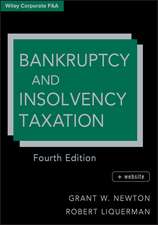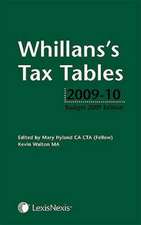The Economic and Compliance Consequences of Taxation: A Report on the Health of the Tax System in New Zealand
Autor Patrick J. Caragataen Limba Engleză Hardback – 31 iul 1998
| Toate formatele și edițiile | Preț | Express |
|---|---|---|
| Paperback (1) | 628.49 lei 6-8 săpt. | |
| Springer Us – 11 oct 2012 | 628.49 lei 6-8 săpt. | |
| Hardback (1) | 634.60 lei 6-8 săpt. | |
| Springer Us – 31 iul 1998 | 634.60 lei 6-8 săpt. |
Preț: 634.60 lei
Preț vechi: 746.58 lei
-15% Nou
Puncte Express: 952
Preț estimativ în valută:
121.49€ • 124.94$ • 100.79£
121.49€ • 124.94$ • 100.79£
Carte tipărită la comandă
Livrare economică 15 februarie-01 martie
Preluare comenzi: 021 569.72.76
Specificații
ISBN-13: 9780792381853
ISBN-10: 0792381858
Pagini: 252
Ilustrații: XVI, 252 p.
Dimensiuni: 155 x 235 x 16 mm
Greutate: 0.56 kg
Ediția:1998
Editura: Springer Us
Colecția Springer
Locul publicării:New York, NY, United States
ISBN-10: 0792381858
Pagini: 252
Ilustrații: XVI, 252 p.
Dimensiuni: 155 x 235 x 16 mm
Greutate: 0.56 kg
Ediția:1998
Editura: Springer Us
Colecția Springer
Locul publicării:New York, NY, United States
Public țintă
ResearchCuprins
1. Background and Mandate.- 1.1 Introduction.- 1.2 The Consequences of Taxation.- 1.3 Mandate for the Report on the Health of the Tax System.- 2. Theoretical And Methodological Framework.- 2.1 Scope of the Research Project on the Health of the Tax System.- 2.2 Defining and Measuring the “Health” Consequences of Taxation.- 2.3 Welfare Economics and the Efficiency, or Performance, Ratio.- 2.4 Taxation and Incentive Structures.- 3. New Zealand Tax Burden & Tax Mix Trends in the Twentieth Century.- 3.1 Tax Burden Trends 1890–1994.- 3.2 The Ratios of Tax Revenue Streams to GDP: Total Tax/GDP Ratio.- 3.3 The Evolution of the Tax Mix.- 3.4 A Comparison of New Zealand and OECD Tax Trends.- 3.5 Total Government Expenditure Trends 1950–2000.- 3.6 Conclusions.- 4. The Hidden Economy, Tax Evasion And The Tax Gap.- 4.1 Introduction.- 4.2 The Legal Limits of Tax Minimisation.- 4.3 The Threat of the Hidden Economy.- 4.4 Learned Behaviour and The Theory of Incentive Structures.- 4.5 The Hidden Economy Model.- 4.6 The Learning Paths of the Hidden Economy and the Tax Gap.- 4.7 The Stakes in the Hidden Economy.- 4.8 A Simulation Model Approach to Taxation and the Hidden Economy.- 4.9 Findings, Conclusions and Implications.- 5. The Revenue Potential of the New Zealand Tax System.- 5.1 The Dimensions of Potential Revenue.- 5.2 Static Potential Revenue Under Existing Rules.- 5.3 Dynamic Revenue Potential: Long Term Tax Revenue Generation.- 5.4 Conclusions.- 6. The Macro Efficiency Effects of Taxation.- 6.1 Introduction.- 6.2 Taxation, Economic Growth and Deadweight Loss.- 6.3 The Tax Mix and Economic Growth.- 6.4 Taxation and Employment.- 7. Review And Assessment of the Health of New Zealand’s Tax System.- 7.1 Introduction.- 7.2 Measuring the “Health” of the Tax System.- 7.3Key Findings on the Total Tax level and Tax Mix.- 7.4 Key Findings on the Hidden Economy and Tax Evasion.- 7.5 Sources of Tax Evasion.- 7.6 Tax Evasion Responses to Tax Changes.- 7.7 Trends in Corporate Tax Payments.- 7.8 Key Findings on Economic Growth and Employment.- 7.9 ‘Best Practice’ Tax Policy Frontiers and their Implications.- 7.10 Summary Scorecard: Economic, Compliance and Revenue Health of the Tax System in New Zealand.- Appendices.- 1. Working Papers on Monitoring the Health of the Tax System.- 2. Different Approaches to Measuring Effective Tax Rates.- About the author.- References.
Notă biografică
Patrick James Caragata received his PhD in political economy from the University of Toronto in 1981. In June 1988 he moved to New Zealand and became chief economist at the Ministry of Energy where he redesigned the royalty regime for petroleum. His book Resource Pricing: Rent Recovery Options for New Zealand's Energy and Mineral Industries (1989) is now used as a standard reference tool for designing resource royalties in Asia and Latin America. In 1991 he became chief tax policy adviser with Inland Revenue in New Zealand. He redesigned the petroleum mining taxation regime in 1991, and worked extensively on international tax issues for several years. In 1994 he initiated the work to monitor the Health of the Tax System. As special adviser taxation economics he led the production of 37 working papers and the Report on the Health of the Tax System in September 1997. In October 1997 Dr. Caragata was appointed managing director of McCallum Petterson Financial Diagnostics Ltd. in Wellington. In 1998 he edited The Economic and Compliance Consequences of Taxation: A Report on the Health of the Tax System in New Zealand, also published by Kluwer Academic Publishers.









